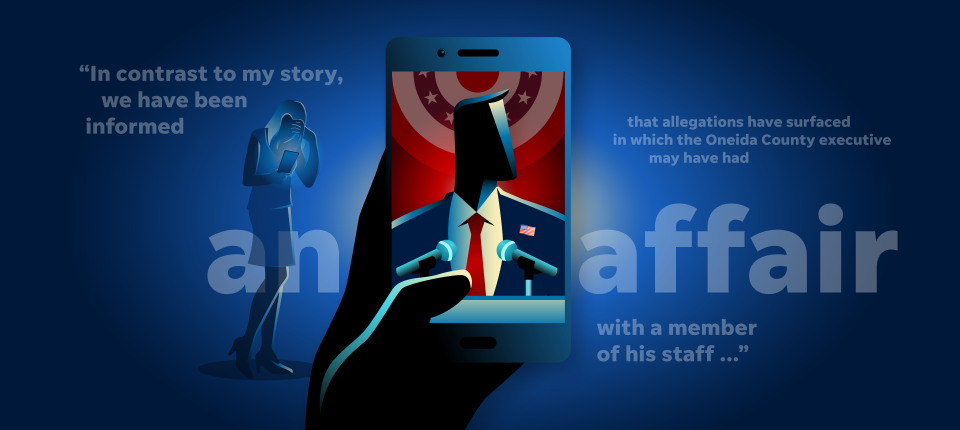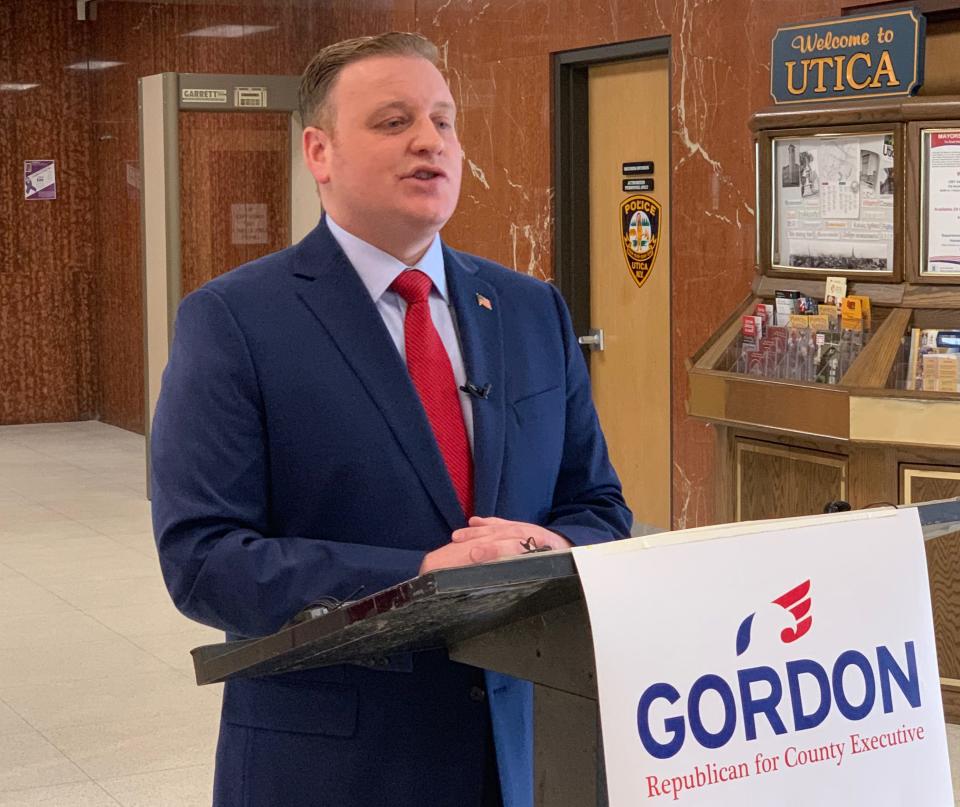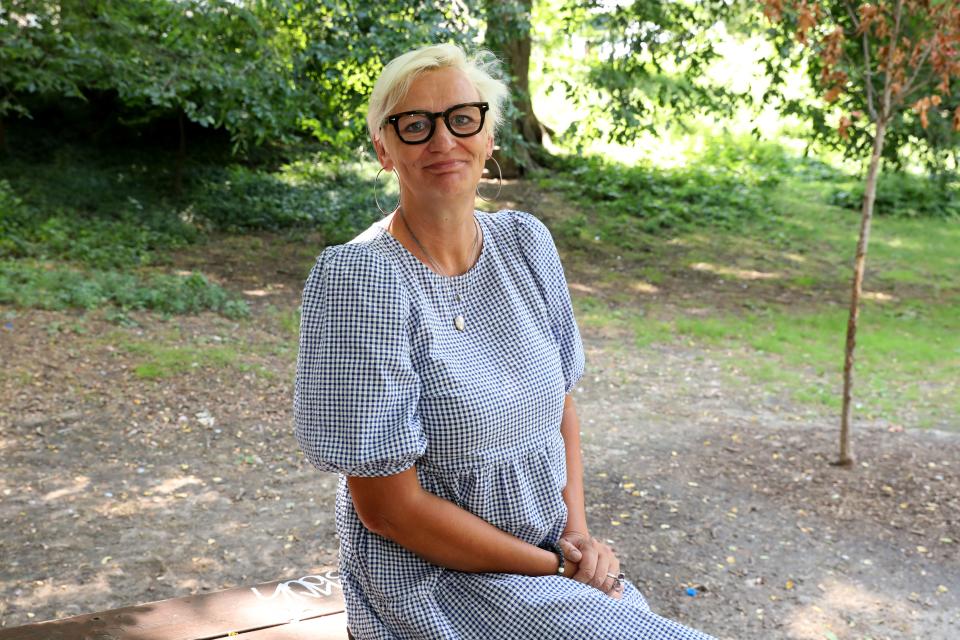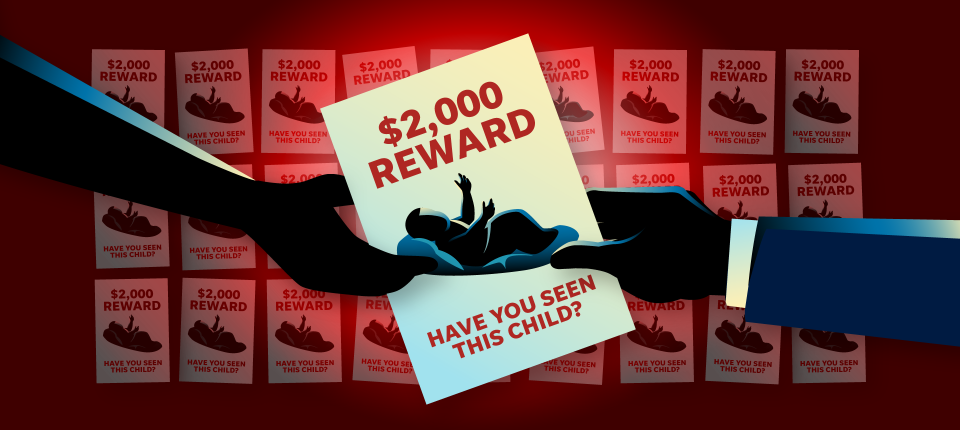How a NY politician targeted a woman’s reputation, and what it says about truth in America
Editor's note: The illustrations that accompany this report are an artist’s creative rendering of events depicted in the article.
The candidate made sure his hair was in place, his red tie just right, the American flag pin straight on his lapel.
This was an important day. The words he was poised to say – to the media he had summoned to Utica City Hall – could make or break his campaign.
He strode to the lectern, interlaced his fingers, looked out at the cameras.
And within minutes, David Gordon began to lie.

Chapter One:
The Campaign, the Text and the Lie
That morning in February 2019, Caitlin McCann was at work on the third floor of the Faxton Medical Building. The 36-year-old took pride in her role as vice president of communications at Mohawk Valley Health System — a work ethic inherited down the McCann line.
She’d worked at the family’s restaurant, Piggy Pat’s Barbecue, and grew up with dairy-farm chores: feeding the cows, cleaning out calf pens, “which will build character for sure,” she later said. Life for McCann had two pillars: work and family.
Her grandparents, married nearly 65 years, had seven children. Tons of cousins gathered at holidays and at Utica, New York’s big get-together, July’s Boilermaker Road Race. When she moved to South Carolina in 2010 to work for a publishing company tied to Amazon, she’d still talk with her dad, Pat, at least once a day — usually on her drive to work, and sometimes again on the drive home.
When she missed the birth of her brother Conor’s first daughter, the pull of home became too strong. By fall 2011, she was back in Utica, handling marketing at Faxton St. Luke’s Healthcare. After St. Luke’s merged with St. Elizabeth Medical Center to become Mohawk Valley Health System, McCann was promoted to VP. Part of her job was to be accessible to the media, by phone, email or text.
But that February morning in 2019, her phone was lighting up with a different kind of text.
The text carved Caitlin McCann’s life into two parts: before and after.
It said something about a press conference. Something about a man named David Gordon, who was running in the Republican primary against McCann’s old boss, incumbent Anthony Picente Jr.

Gordon, then 35, was claiming Picente had conducted an extra-marital affair with a former female staffer and had gotten her pregnant. He said he had proof, but he later conceded in court that he didn’t.
McCann was Picente’s only former female staffer.
It wasn’t true, despite what Gordon said that day – and what he still maintains to this day.
But McCann’s career had taught her the power of a message: who spreads it, who hears it, who believes it. When David Gordon took to the lectern and began to speak, his words took powerful aim at her, her identity, her reputation. The morning of Feb. 11, 2019, she was a hard-working career woman who loved her family. Gordon made her a pawn in a political smear campaign built on the most insidious kind of lie.
‘Fake news’ in today’s America
If Caitlin McCann’s life represents a certain kind of American story – roots tied to a deep appreciation of loyalty and labor – then so does David Gordon’s. It is a story of our times, as American as apple pie and the January 6th insurrection.
Look no further than January 2017, when President Donald Trump’s press secretary Sean Spicer falsely claimed his boss’ inaugural crowd eclipsed that of his predecessor. When Trump presidential counselor Kellyanne Conway appeared on NBC’s “Meet the Press,” host Chuck Todd asked why Spicer had uttered “a provable falsehood.”
Conway’s answer: Spicer was giving “alternative facts.”

Anything that countered those alternative facts? Trump had a name for that, too, one that became part of American discourse as a way to dismiss any opinions – no matter how factually based – as meritless.
He called it fake news.
In a recent interview, David Gordon still insisted his accusations against Caitlin McCann were true, despite losing a defamation case to her in New York State Supreme Court in 2021. There was an affair; there is a love child; he’s not the one selling fake news – according to Gordon.
However, public records and court testimony reveal the jaw-dropping trajectory of Gordon’s lie as he worked to perpetuate it across a five-month primary campaign:
McCann’s integrity and morals were questioned.
She was called a victim, then a liar, party to a massive cover-up.
A family photo was stolen and offered as something it wasn’t: “proof” that she had had a child with Picente.
Another photo was doctored in Photoshop to “show” her and her ex-boss and a baby, using a headshot from her work website.
She was the target of a private investigation, her Social Security and phone numbers accessed, along with a list of places she’d lived.
Gordon, who had relocated to South Carolina, drove two hours to McCann’s former Charleston neighborhood, papering it with flyers offering a $2,000 “reward” for information on the whereabouts of the “child.”
Facebook pundits would assume, based on the posts they’d seen, that McCann had given birth to a child. They deduced that the only way to prove its parentage was a DNA test — for a non-existent child.
The USA Today Network New York reached out repeatedly to McCann, seeking comment on what she endured. McCann declined interview requests, saying she had been validated by the courts and wanted to move on with her life. But her own defamation suit testimony revealed that, over the course of the campaign, McCann couldn’t sleep. She felt like she was being watched, judged by strangers. It affected her work and personal life. She couldn’t go to the mall with her niece, fearing people would think her niece was “the child.” She avoided public places. Eventually she’d seek counseling.
She wondered what she’d done to deserve such hateful attacks. What she had done was to at one point work for Gordon’s opponent, Anthony J. Picente Jr.
Today, more than five years after a White House-sanctioned lie became rebranded as “alternative facts,” all-important midterm elections are days away, and the 2024 presidential race is on the horizon. Even school board elections are drawing outsized interest, with talking points drawn from the national culture wars.

Caitlin McCann’s treatment at the hands of David Gordon is a tale of our take-no-prisoners political age, where misinformation is created for the very purpose of insinuating itself on social media feeds and in the minds of voters. Many bought Trump’s Big Lie about a stolen 2020 election, but if there are buyers for false claims, there have to be sellers.
In American politics these days, it’s a seller’s market.
Gordon lost his primary race against Picente, who also declined requests for comment for this article, in June 2019 by a 2-to-1 margin. Eventually, Gordon lost the defamation suit, too, with New York State Supreme Court Justice Scott DelConte ruling “that Gordon had defamed (McCann) during a series of live media events and press releases.”
The judge called Gordon’s actions callous, cruel and malicious, morally reprehensible, “made with an utterly wanton and reckless disregard for her rights and the harm that those lies could cause her.” He ordered Gordon to pay McCann nearly $400,000 for the damage he’d done.
By any logic, that should have been the end of both David Gordon’s political ambitions and his pursuit of the “truth” about Caitlin McCann.
But this is today’s America: post-Trump, polarized, pandemic-weary. And in today’s America, David Gordon has been emboldened to continue his pursuit both of political office and proof of McCann and Picente’s nonexistent affair.
The ruling doesn’t bar Gordon from seeking public office again – which he flirted with last spring. Or from promising “news” with regard to the case, as he did again this summer. Gordon told the USA TODAY Network he considers himself a whistleblower, blasted a “cabal” of Oneida County officials from both parties for closing ranks around Picente, and railed against DelConte’s decision.
He believes in the story of the affair and the child. He believes his First Amendment rights were infringed.
David Gordon believes he told the truth, though he could muster no proof to support it in court. The problem is, when he spoke, others believed him, too.

Chapter Two:
A Rumor in His Pocket
It was Feb. 8, 2019, and David Gordon was desperate.
His campaign for county executive was just eight days old when a skeleton surfaced. Bill Keeler, a Utica radio station hostwas reading from a police report detailing an alcohol-fueled incident when Gordon’s fiancée called Utica police on Aug. 17, 2017. Gordon had been drinking, she said. He had pinned her to the ground, threatened to kill her, and smashed her cellphone before driving off at about 2:15 a.m. in his blue Porsche Boxster. She was worried, she told police, because Gordon owned a pistol.
Gordon knew the report was accurate, but he also knew it was supposed to have been sealed when his fiancée declined to pursue charges. But there it was, on “Keeler in the Morning” that Friday.
Gordon spent the weekend weighing his next move. He’d acknowledge the incident, but say his fiancée was experiencing “some unexplained emotional issues” and was in an “emotionally charged mindset” that led to the incident.
Which is what he did. He said the couple soon learned she was six weeks pregnant and “concluded that a contributing factor to this one-time occurrence was because of some hormonal changes and, obviously, my inexperience in how to handle this type of situation.”

David Gordon could have ended his Feb. 11 press conference with his version of what happened that night in 2017.
But he didn’t. The rumor in his pocket was too tempting not to share.
It had started simply, at a Lions Club meeting at the Savoy Restaurant in Rome in early 2012. And it could have stayed right there, a rumor dying for lack of oxygen. But rumors have a way of spreading. And political rumors can metastasize in the body politic. The rumor caught the ear of Gordon — then a Democrat, later a Republican — who tucked this particular tale into his pocket for seven years.
Then, when he needed it most, 72 hours after the Keeler bombshell, he stood at that lobby lectern and weaponized it in front of assembled media, girding it with claims of proof he later admitted he could not produce.
He spent exactly 2 minutes and 14 seconds discussing the 2017 domestic-violence incident and its aftermath — including the part where he blamed the episode on his fiancée’s pregnancy. Then he shifted the focus to the rumor.
He began: “In contrast to my story, we have been informed that allegations have surfaced in which the Oneida County executive may have had an affair with a member of his staff …”
He didn’t name McCann directly, not at first; that would come months later. Instead he described a female staffer who had worked for Picente, and who had relocated to South Carolina in 2010. McCann was the only such staffer, Picente’s only female staffer, which is why Picente’s former chief of staff, Al Candido, texted McCann that February morning to tell her about the press conference.
He told her Gordon was talking, and talking about her.

“Anybody who knew the situation would have known that he was talking about me,” McCann testified during the defamation suit. “It was concerning that this was the route he was going with his campaign and, you know, that he was saying these things that weren’t true to try to further his own agenda.”
Eva Brindisi Pearlman served as McCann’s attorney, along with her father, Louis Brindisi. They shared a firm with Pearlman’s brother, one-time congressman Anthony Brindisi. Gordon, Pearlman said, was no political novice.
“I think even in the February press conference, he’s really inviting the media to go investigate because he doesn’t have the information,” Pearlman said. “He’s hoping that the media will pick up on some story and investigate to do the work that he didn’t do before. In his deposition, he admits that, to this day, he has no proof that there was ever a child.”
On May, 22, 2020, McCann’s attorney asked Gordon: “Did you ever discover whether or not a child had been born in South Carolina?”
No, Gordon conceded.
David Gordon doesn’t concede often.
Three days after the February press conference, the YWCA Mohawk Valley held a press conference of its own, blasting Gordon for “victim-blaming” his fiancée and failing to take responsibility for his own actions in the domestic dispute. True to his double-down nature, Gordon attended the press conference and read a statement he said was written by his fiancée, Deanna DiNardo, who was not present.
“I find it inherently wrong for this organization to publicly slander my fiancé’s character and respond so invasively to our situation,” Gordon read. “I am not a victim. I am not a survivor. I am not an object that you people objectify and magnify for political gain. I am a person. I am a mother. I am a woman. I am a life partner to Dave.”
The next day, Gordon received the report of a private investigation into McCann, including her date of birth, Social Security number and phone number, prior addresses, and personal information about her parents and her brother. It was the next step in what DelConte would later call an obsession with McCann.
Gordon’s path to politics revealed itself gradually. His father was a mechanic for Utica Transit Authority, and his mother worked for General Electric before becoming a nurse. He grew up with two brothers and a sister, and graduated from New Hartford High School. He left Mohawk Valley Community College before finishing, earned his insurance certification from Bryant and Stratton College in Syracuse. He worked for J.C. Penney and then became president and CEO of Partners Trust Insurance Agency Inc., in Utica.
He was a one-term Oneida County legislator from New Hartford, New York, in 2012-13, ran unsuccessfully for re-election, was disqualified in the 2016 primary for Congress over petition signatures. In 2018, he ran for Oneida County clerk as a Republican, in a bitterly fought campaign against incumbent Democrat Sandra DePerno, and lost by 2,156 votes of the 77,084 cast. Gordon learned from those campaigns: Stay on the offensive, never let an opponent’s claim go unchallenged, never back down if you can double down. Those campaigns led Gordon to that City Hall lectern, and to the pivot he chose to make.
But if Gordon thought he could say anything about Caitlin McCann and get away with it, then he didn’t know Caitlin McCann. She knew right from wrong, and cherished her family above all. She’d heard her dad say: “What happens to one happens to all.”
“He shouldn’t be allowed to get away with doing that and to just go out and say whatever he wants whenever he wants on television and on the radio and newspaper and just walk away,” McCann would say in court. “It’s like dropping a bomb and walking away and nothing happens, and I don’t think that’s right.”
Weeks after that first news conference, McCann got another text.
“Caitlin, I believe it’s time they [sic] we meet to discuss things before it goes public. Don’t you?”
She traced the number, and found it listed on a David Gordon campaign flier.
‘My stomach literally turned’
Washington Post columnist George Will wrote recently of Pennsylvania gubernatorial candidate Doug Mastriano, “His motives are frightening because they are pure: He has the scary sincerity of the unhinged whose delusions armor them against evidence.”
That description could apply to any number of candidates on political stages both large and small.
Gordon, in particular, is unrelenting in pursuit of his enemies, and can produce an answer for every seeming shortcoming in his actions or arguments. His role as a “whistleblower,” he told the USA TODAY Network New York, was merely him exercising his First Amendment rights to free speech, assembly and to petition the government. Surely the New York Court of Appeals, the state’s highest court, would soon rule on the side of the First Amendment and undo DelConte’s order, he said. When the court dismissed his appeal on Sept. 8, Gordon filed a notice of appeal to the Supreme Court of the United States, on Oct. 7, 2022.
Gordon, whose comments and refusal to retract them led to the defamation case, casts himself as the victim.
He complained in a June 2020 affidavit that “the lawsuit brought against me has harmed my reputation and standing in the community. The mere mention of a suit by the plaintiff cast much doubt about my moral character.”
Shana Gadarian, chair and professor of political science at Syracuse University, has been looking into the country’s partisan divide for a new book she co-authored this fall: “Pandemic Politics: How COVID-19 Revealed the Depths of Partisan Polarization.” It closes with the story of three right-wing radio personalities who told their listeners the virus wasn’t real, then died of COVID within weeks of each other.
“They’re both the victim and the perpetrator of this polarization,” Gadarian said. “There are real consequences for polarization, most dramatically in COVID, but certainly also in our other political culture and how we talk to each other.”
The political divide leads to partisan identities that are more deeply held now than in the past, Gadarian said. “That is certainly what we saw with January 6th and with the Big Lie about 2020.”
The rift has taken its toll on trust in institutions. The Pew Research Center in June reported “public trust in government remains low, as it has for much of this century. Just two in 10 Americans say they trust the government in Washington to do what is right ‘just about always’ (2%) or ‘most of the time’ (19%). Trust in the government has declined somewhat since last year, when 24% said they could trust the government at least most of the time.”

Luke Perry, a political columnist and TV correspondent for Utica’s NBC affiliate, had a front-row seat for the Gordon saga.
Perry is a Fulbright scholar who chairs the government department at Utica University and directs The Utica University Center of Public Affairs and Election Research. His latest book, “Donald Trump and the 2018 Midterm Battle for Central New York” (Palgrave, 2019), looked at Trump’s impact on the 2018 midterm campaigns by examining four congressional races in New York.
Perry said it’s not uncommon for there to be personality clashes in political primaries, especially at the local level, but that those clashes are typically handled behind the scenes and not played out for the cameras, as Gordon’s was.
“That kind of stuck out to me,” said Perry, who added that Gordon’s behavior reflected a switch in how some politicians communicate: an acceleration of “purposeful misinformation,” more personal in nature, that feeds a 24-hour news cycle and is fanned by social media. In that way, Perry said, Gordon’s for-the-camera drama looked more like a national campaign than a local one. Politicians are using misinformation in a strategic manner to get into or remain in office, he said.
Hilde Van den Bulck, chair of the communications department at Drexel University in Philadelphia, read the facts of the Gordon case and had an immediate reaction.
“My stomach literally turned when I was reading it,” she said. “It’s very hard to read how someone so consistently just goes after someone (who is), according to the courts, an innocent person.”
In the Gordon case, Van den Bulck sees a confluence of media, social media and a candidate exploiting the moment in which he finds himself.
“Social media didn’t invent all this. It goes back to the dwindling trust in our institutions, the Pew data. The Pew Research Center asks regularly about trust in public institutions and it has gone down overall. The Gordon campaign was a kind of opportunism, a sort of savvy in certain ways to know what will work. Maybe when he started this, he didn’t expect to end up where he is now.
“But these things take on a life of their own.”

Chapter Three:
Photoshop, Facebook and Fake Photos
McCann refused to reply to the text: “I believe it’s time they [sic] we meet to discuss things before it goes public. Don’t you?”
But one day later, as she and her then-boyfriend dined at Ancora!, in Utica, another text arrived, this time from McCann’s sister-in-law, Miya.
It was a link to a post on the “YES Hospital St. Luke’s Campus” Facebook page. The page had taken a side in the debate over where MVHS should put its new Wynn Hospital, which would join St. Luke’s, St. Elizabeth and Faxton campuses. The Facebook page favored the St. Luke’s Campus.
Gordon became one of the Facebook page’s administrators and used the page to promote his campaign against Picente and McCann.
That night, in Ancora!, McCann clicked on the link and lost her appetite.
What she saw — what anyone who went to the Facebook page could see — was an image that purported to show Picente and McCann holding a baby, with palm trees in the background. But McCann knew it was a fake photo for two specific reasons: Her face in the photo was clearly Photoshopped from her headshot from the MVHS website. And the event had never happened; she had never had a child with Picente, had never been pregnant.
“I was immediately sick to my stomach, very upset and very embarrassed,” she testified. “I immediately felt like everyone was looking at me and, you know, thinking these things were true, and I wanted to leave. So we got the check, and we left.”
She went home. Caitlin McCann’s job was to spread information. Now she watched helplessly as a lie spread and grew, and desperately wished it would all go away.
“I was very upset, you know, crying. I didn’t really want to talk to anybody about it,” she testified. “I didn’t want to make it more known than it already was. I didn’t know how many people had seen it, but I didn’t want to spread it around even more.”
It got worse.
The next day, another text arrived from a co-worker, pointing to a post on the “YES Hospital St. Luke’s Campus” Facebook page administered by Gordon. It used a photo taken from McCann’s Facebook page that showed her holding a baby. A false and defamatory statement was plastered across it: “Breaking News: Picente Has Affair with Staffer. Ex Staffer McCann Given Huge Payraise Sent to Charleston, SC to Give Birth.”
What the photo actually showed was McCann holding one of her nieces. And the “pay raise” mentioned was one that had been proposed for several county workers in an initial Picente budget plan, but was abandoned during the budget process. Caitlin McCann was never given a raise and she had never given birth. A sweet family photo had been turned into something dirty and defamatory.

Gordon denied being the source of the photo; DelConte ruled otherwise.
McCann remembered her father’s words: What happens to one happens to all.
She filed a harassment complaint with the Utica Police Department on March 18, 2019. She wanted a record of Gordon’s actions, unsure of what would happen next. An officer told her to reply to Gordon’s text: “I don’t know who this is. Do not contact me again.” She did.
A week later, a photo was posted to the “YES Hospital St. Luke’s Campus” Facebook page.
It showed McCann’s former home in South Carolina, and the caption read: “New Information tonight into the alleged affair of County Executive Tony Picente and Caitlin McCann, Vice President of Marketing for MVHS. This was the first place of refuge for the former pregnant staffer in Charleston, S.C.”
It got even worse.
Gordon held another press conference, on May 15, 2019, this time specifically naming McCann out loud as the staffer in question, after naming her in Facebook posts.
Gordon accused McCann and Picente of having an affair in the county office building during work hours, framing it in vulgar terms as he invoked a proposed-but-dropped 2009 pay increase: “As things heated up, McCann was rewarded with an unprecedented pay raise of 20%. He got a rise, and she got a raise.”
McCann, in her office with her staff nearby, was stunned.
“It’s disgusting, and as a professional woman, it’s one of the worst things somebody can say about you,” she testified.
Gordon went on to accuse McCann of becoming pregnant and Picente of demanding she move to South Carolina to give birth to the child in “one of the biggest cover-ups in Oneida County history.”
Later that day, Picente held a news conference.
“This junk that was put out by Mr. Gordon is an absolute lie from the first sentence all the way through and everything he has said about me,” Picente said. “It borders on mental illness that this man will say anything to get in front of a camera and to get his name in print. This is a disgusting example of what politics is not supposed to look like. This man has no place in public office.”
McCann’s boss, Mohawk Valley Health System President and CEO Darlene Stromstad, called Gordon’s comments “an act of desperation by a political candidate to sully the reputation of a political opponent and a professional young woman. Dave Gordon should be ashamed of himself for these mistruths and the harm he is causing these individuals and families.”
Even Gordon’s party leader blasted him. State GOP Chairman Ed Cox said: “Dave Gordon is a Bernie Sanders supporter who not only has no business in a Republican primary, he is also totally unfit for public office. His record of domestic violence and outlandish smear campaign should be deeply concerning to the people of Oneida County and voters of all parties should reject his candidacy.”
At the end of his press conference, Gordon said: “I would love for them to slam me with a defamation suit.”
Gordon would get his wish.
‘Something may have occurred’
Gadarian, the Syracuse politics professor, said what Gordon did was “outside of any normal bounds of politics.”
“I think it sounds very Trumpian, very Alex Jones-like,” she said, invoking the “Infowars” host. “But I don’t think that that is still the norm in politics. Only Donald Trump does not pay a consequence for this. But Alex Jones has been under oath and has judgments against him. I think that there is a short-term gain for making outrageous claims in politics because it does get people’s attention. But when it isn’t sustained with any kind of truth, it looks very transparent. I think honesty is still the coin of the realm in politics.”
Trump, she said, “walks the line very well — I’m not sure normatively well, but I think strategically well — between ‘I’m going to say something where I can walk it back later’ and ‘I’m going to say something kind of outrageous.’ I don’t know that anyone else does that as well as he does.”
She doesn’t see many similar examples on the left.

“It’s not that it is not there. It’s just that’s not a part of the left right now,” she said. “I’m not making a claim that Democrats are more honest. It’s just that I don’t think that this kind of showmanship, where ‘I’m going to tell falsehoods’ works as well on the left. A lot of (President Joe) Biden’s campaign was about bringing back normal discourse and normal politics.”
In the heat of the Gordon-Picente campaign, Gordon sought the proof he had told the media he had. DelConte ruled that Gordon, instead, presented photos he said showed one thing when they were really something else, a photo that was faked.
Gordon’s campaign to terrorize McCann, a private citizen, would involve Facebook posts and two press conferences, with vulgar suggestions of adultery, corruption and cover-up. At that first press conference, the “proof” he offered was: “I have seen firsthand how this administration operates and can say without a shadow of a doubt that something may have occurred.”
Something, he said, may have occurred.
“To this day, Gordon still thinks that because what he considers reliable sources had told him about these rumors that he had the right to talk about this, to spread this information,” said Pearlman, McCann’s attorney. “It didn’t matter that they were rumors, gossip, hearsay. It didn’t matter. He had heard it from what he claims are reliable sources. And that gave him enough to get out in front of his pulpit and spread this information. But he really did no independent fact-finding out at all to confirm whether this gossip, hearsay, rumors were, in fact, true.”
In his deposition, Gordon mentioned a host of Oneida County officials, employees and citizens from whom he’d heard rumors.

One was former Oneida County Legislator Larry Tanoury Jr., a Democrat who had considered Gordon a friend. When Gordon weaponized the rumor, Tanoury said he cut off all ties, even blocking Gordon's calls on his phone.
Before he did that, Tanoury said he had one last conversation with his soon-to-be former friend.
"I said 'I get the politics. I get that you were upset that they went after you and attacked you. But with all due respect to you, Dave, what they attacked you on, the way they got the information was dirty and all that, but they put out stuff that was true. You're putting out things that are not true and you got other people involved. This is a young girl, a professional in a small town, who's trying to build a career, I'm sure wants to build a family. You got Tony. His wife doesn't deserve that. And you have zero proof at all about it. You can't just go out there throwing that out there. I mean, it's damaging.'"
A year later, on June 26, 2020, Gordon called Tanoury – as a witness in McCann v. Gordon, via a Zoom call, amid the pandemic.
“I could tell Dave wasn't happy,” Tanoury said. “I almost felt bad for him. I'm like, 'I don't know what he wants me to say. Like, does he want me to lie?'."
When Tanoury was asked in his deposition if had any direct knowledge of a Picente-McCann affair, of a McCann pregnancy, of McCann being sent to South Carolina, he replied, three times: “Absolutely not.”
Gordon said others had told him about the affair, including Congresswoman Claudia Tenney. He said Tenney had shared a text message from sheriff’s deputies about seeing McCann and Picente in the county office building garage after hours.
Asked to comment on her role in the case, Tenney, in a statement, said: “I did not provide an affidavit, and I do not have any personal knowledge or evidence of a relationship between the county executive and the woman alleged in the complaint.”

Rocco LaDuca, a radio host and former Observer-Dispatch reporter, was also called as a witness but was shielded from being compelled to testify by a journalist’s privilege. He declined to comment for this story. What is the state of defamation in America? There’s the high-profile, endlessly parsed, he-said-she-said of the Johnny Depp-Amber Heard trial.
In June, a Virginia jury decided that Amber Heard had defamed actor Johnny Depp when she wrote a 2018 op-ed in The Washington Post and called herself ‘a public figure representing domestic abuse.” Heard was ordered to pay Depp $10 million in damages.
Then there’s this: Families in Newtown, Connecticut, sued the conspiracy theorist Alex Jones for repeatedly spreading the lie that the 2012 Sandy Hook school shooting was a hoax. The families were harassed and subjected to death threats by followers of Jones, who were whipped into a frenzy on his “Infowars” show and website. Jones would later admit he did not think the deadliest school shooting in American history was a hoax, but the seed was already planted and the donations had already poured in, the merchandise already sold. A Texas jury in August awarded the parents of slain Sandy Hook 6-year-old Jesse Lewis $4.1 million in compensatory damages for the suffering Jones and his followers meted out on them and $45.2 million in punitive damages. Jones plans to appeal. A Connecticut jury just awarded the Sandy Hook families nearly $1B in their suit against Jones.
And then there are defamations that don’t see a courtroom, the conspiracy theories and rumors. Remember 2016’s “Pizzagate”?
In that bizarre case, also fueled by Jones and “Infowars,” a hacked 2008 email between Hillary Clinton campaign chair John Podesta and Washington, D.C.’s Comet Ping Pong pizzeria, about a possible fund-raiser was twisted into a conspiracy in which “cheese pizza” was somehow code for “child pornography.” It was all the proof some needed to see a far-reaching Democratic child-sex ring.
It took off, fueled by social media bots and Jones and later fanned by QAnon.
All it needed was a lie, a platform, and an audience.

Chapter Four:
2,362 Votes
Caitlin McCann didn’t want a lawsuit. She wanted Gordon to stop. And she wanted a retraction.
On May 23, 2019, Pearlman sent Gordon a letter asking him to cease and desist his actions against her client, and to retract his statements. He refused.
On June 4, 2019, Gordon got his wished-for defamation suit, McCann v Gordon, which charged: “The defendant, David Gordon, has launched a campaign to terrorize an innocent person, the plaintiff, Caitlin McCann, and to destroy her reputation, orally and in writing, by spreading falsehoods about her for the sole purpose of furthering his own political ambitions.”
When the case began, both sides agreed to stay off social media and not to comment to the press. But Facebook had been the oxygen for Gordon’s campaign. The “YES Hospital St. Luke’s Campus” Facebook page had become a stalking horse for his allegations, with “breaking news” alerts. Soon, Gordon would bristle at the gag order, at all those microphones and cameras pointed elsewhere. He would ask, unsuccessfully, for the order to be lifted.

Meanwhile, in the Republican primary — the reason for Gordon’s campaign — Picente prevailed 2-to-1. Of the 7,425 votes cast in the primary, 4,902 Republicans voted for Picente, 2,362 went to Gordon, 134 left their choice blank and 27 wrote in other names. (Picente also drew 107 conservative party votes.)
There’s no way of knowing what motivated Oneida County voters to vote the way they did in June 2019. But consider this: More than 2,000 Republicans walked into their polling places, showed their IDs, and were handed paper ballots. Faced with a choice for county executive, they filled in the bubble next to David Gordon’s name.
Perhaps they believed Gordon’s lies, or didn’t care. Perhaps they liked Gordon’s platform better, or they simply disliked Picente. Perhaps they didn’t believe their state party chair when he called Gordon “totally unfit for public office.”
More than 2,000 times, someone considered the options, weighed what they knew, and cast their votes for David Gordon.
A defeated Gordon told the Utica Fox affiliate on election night: “If these results are accurate, which I believe they are not, this area is completely shot, beyond hope and at the point of no return. If this (sic) results are accurate, welfare, corporate welfare and mentally debilitated people are the only people left here. No real, reputable Republican would vote for Anthony Picente. My family is moving south and all the liberal RINOS (Republican In Name Only) can enjoy this socialist, backward thinking/voting community.”
Picente looked relieved on primary night, declaring “the past five months felt like five years.”But the primary didn’t end things. There was still McCann v. Gordon. And unlike David Gordon, the case wouldn’t go away.

It could have, had Gordon ceased and desisted and issued a retraction. Or it could have in the final days of 2019 when DelConte gathered Gordon’s attorney, Richard A. Altman, McCann’s attorney and lawyers for Picente, whom Gordon was suing with others over the release of his arrest record. DelConte wanted to see if both matters could be settled. But as those talks progressed, Gordon stepped in and fired Altman, deciding to act as his own attorney. (Gordon’s suit against Picente et al. was dismissed on Feb. 20, 2020.)
“He had the chance to take it back, and he didn’t,” McCann testified. “He not only didn’t take it back, he doubled down and continued to say it, and he has zero evidence of the lies.”
In May 2020, McCann got another text.
Gordon had posted a flier on the “YES St. Luke’s” page that he said he was distributing in McCann’s former South Carolina neighborhood, offering a $2,000 cash reward for “information leading to the whereabouts of the child of Oneida County Executive Anthony J. Picente and Caitlin McCann.”
If McCann doubted that Gordon had actually made the more-than-2-hour trip from his home near the Georgia state line to her former neighborhood in Charleston, that doubt disappeared when she returned home one day to a voicemail.
“A woman who lived in the apartment complex that I lived in when I first moved to Charleston called me because she received a flier” that looked like a missing-person poster, McCann testified. “She was worried that I had been abducted or something bad had happened to me. She said she spoke with Dave Gordon who said he was just trying to find out information about me.
“It’s very scary that he’s clearly amping it up a little bit by offering money,” McCann said in court. “He’s going to continue this, and then with the cash reward and he’s posting it on social media, who is seeing that, who is taking it seriously and is actually going to start looking for this child — supposed child?”
Getting the voters’ attention
Van den Bulck, the Drexel media scholar, said the peril of campaigns based on over-the-top accusations — whether they are true or not — is that while they attract voters’ attention, they debase the political dialogue and reduce it to entertainment. Voters watch the coverage as consumers, not as citizens.
Some voters may get turned off by David Gordons, some may be drawn to them, but Van den Bulck said it is the duty of voters to act as citizens, not passive consumers of news, to interrogate the facts of the campaign, to engage and make an informed choice.
Gadarian, at Syracuse, said the challenge is getting voters to pay attention to politics.
“A lot of people know a lot more about the Kardashians than they do about the workings of government,” she said. “So how do you compete with that? It doesn’t mean that you have to make politics like ‘Real Housewives’ or whatnot, but it does mean that there has to be something engaging, just given the information environment we live in.”
That competition for attention has made some political discourse coarser, she said.
“I like to think we have to have norms of how we treat each other, both interpersonally and in politics,” Gadarian said. “I think we’re not out of the realm of having those norms, but I think those norms are a lot softer than they were before Trumpism. And that the people are testing the norms. They have been kind of battered.”
Reversing the trend in hyperpartisan misinformation and smears in politics won’t be easy, Utica University’s Luke Perry said. And it would only happen if the public demands it.

On Feb. 10, 2021, one day before the two-year anniversary of that press conference, New York State Supreme Court Justice Scott DelConte ruled for McCann in summary judgment, meaning he was convinced that the legal requirements for defamation liability had been met and did not require a jury.
“Despite Gordon’s self-serving claims to the press over a year ago that he had actual evidence of the corruption and affair, he offers none to this Court,” DelConte wrote. “Innuendo is not evidence, and an individual who publicly spreads rumors that are not based in fact will be held liable for the damage that he causes.”
Eight months after he ruled for McCann, on Oct. 8, 2021, DelConte ordered Gordon to pay McCann $394,416.10, with interest, for statements that were “intentional and defamatory.” The total includes $40,000 for humiliation, $50,000 for past mental anguish, $50,000 in punitive damages.
He also awarded McCann $250,000 for future mental anguish.
Because what David Gordon did to Caitlin McCann didn’t end when Picente beat Gordon in the Republican primary. It didn’t end after primary night, when a defeated Gordon moved his family to South Carolina, to a town called Bluffton. It didn’t end when DelConte brought his gavel down.
And the consequences of the case didn’t end Gordon’s political ambitions.
Even as the McCann v Gordon defamation case was winding down in January, the former candidate sent a collective gasp across Oneida County political circles, saying he’d seek the Republican nomination for county clerk. He missed the deadline to file petitions to enter the GOP primary, and a May 31 deadline to run on a minor-party slot,and didn’t make the ballot.
But David Gordon is still out there. He could still run again, here or in the South. And McCann is still haunted by his words.

Chapter Five:
What the Lie Took Away
On June 8, 2021, Pearlman asked McCann on the stand: “Do you think there will ever be an end?”
“I honestly don’t,” McCann replied. “I feel like, you know, his focus on me, it might have been Tony, and I was collateral damage before, but, now, his focus has been on me since I brought this lawsuit, and he continues to focus on me.”
Gordon had said as much. In an affidavit filed on Sept. 15, 2020, seeking to convince DelConte not to order a summary judgment, Gordon wrote: “Regardless of the court’s decision and or its potential unwavering support to its political base, the truth will come out whether it is in trial, after summary judgment, one day, one week, one month, one year or 10 years. Those that have lied, aided, and abetted and or have an ulterior motive to advance their career and agenda will be prosecuted for perjury among other things. This is a promise not a threat.”

In the recent video interview, Gordon’s image was a lesson in messaging. Connecting from Georgia, where he now lives, Gordon sat in front of a poster featuring the word “integrity.” He wore a blue blazer and white shirt that coordinated with the flag lapel pin which matched the American flag behind him. The image projected the democratic warrior fighting for old-fashioned, all-American values amid the political maelstrom of corruption and cronyism.
Gordon said he didn’t get his day in court in front of a jury. When DelConte ruled he had defamed McCann, Gordon said, “the court made a determination without enough evidence, enough information, and without a jury. They were able to kind of depict a scenario or a situation by creating an opportunity for damages, but we never talked about the actual liability.”
Pearlman said she sees it otherwise.
“Summary judgment is what we call a drastic remedy,” she said. “The judge makes that decision as a matter of law, meaning that there’s no factual decisions that need to go to a jury. As a matter of law, we met the legal requirements to prove a defamation case. We proved our case and he was unable to create a factual dispute.”
“That’s not how you should conduct a campaign,” Pearlman said. “You shouldn’t be spreading lies for political points.”
Pearlman said she was proud that McCann took the stand. As a member of a family that moves in political circles — her brother was a one-term Congressman — Pearlman said the case resonated with her.
Gordon said he sees a vast cover-up at work, from District Attorney Scott McNamara declining to investigate Gordon’s charges to McNamara and Sheriff Rob Maciol and Oneida County Clerk Sandra DePerno — all Democrats — appearing at Picente’s re-election announcement. “This is a group that sticks together,” he said in the recent interview, adding that he believes the cover-up even reached into the courtroom where McCann v Gordon was heard.
“I believe it’s that big of a cover-up,” he said. “They have their people, the judiciary.Scott DelConte worked for a prominent law firm out in Syracuse that has very close connections to Brindisi and his family.” Gordon did not respond to repeated requests to support this allegation, but Pearlman did.
"I didn’t even remember who Judge DelConte worked for in Syracuse prior to his becoming a judge, until I just looked it up and learned he worked for Bond, Schoeneck & King," she wrote in an email. "Our law firm does not have close connections with that firm. We have had cases with lawyers from that firm over the years, as we have with many other Syracuse law firms since we all practice in the Central New York area. I do not recall having any dealings with DelConte until after he became a judge in 2019."
DelConte was the judge who certified Claudia Tenney as the victor in the razor-thin 2020 Congressional race in the 22nd district, against Anthony Brindisi.
When Gordon was asked, in the recent interview, if he believes that McCann had a child with Picente and whether that child is living somewhere — something for which he had no proof in court — he replied: “I do.”

Gordon wouldn’t rule out another run for office, saying: “It’s kind of up in the air at this point.”
“At this point, I’m dedicated to my family, to my business, but I watch everything that goes on,” he said. “So anybody that doesn’t think that I know what’s going on in Utica, I read the papers, I read the O-D, I read the news. I have a lot of friends there that give me information. So I’m very well in-tuned to everything that goes on.”
As to whether McCann will ever see the $400,000 Gordon owes her — money she has vowed to donate to the YWCA, because “they empower women and stand up for them” — Pearlman would only say: “We’re certainly trying to collect the damages, the judgment.”
But it’s not about the money. It’s about how a lie, in the hands of someone with a platform — deployed for a couple thousand votes in a losing campaign in Oneida County, New York – can irreparably damage a private citizen’s life.
There were no winners.
Not Anthony Picente, who won the primary and re-election but endured political smears aimed at him and his family. Not David Gordon. Not the people of Oneida County. And certainly not Caitlin McCann.
“He took away time with my family, with my nieces,” she testified. “He took away my privacy. I was not a public person. … I don’t feel safe. I don’t think he’s done. I don’t think he’s going to be done, if ever. So I feel like I am always going to be looking over my shoulder, that he’s going to do something else.
“You know,” she said. “What’s going to come next?”
This article originally appeared on USA TODAY NETWORK: How David Gordon defamed Caitlin McCann in a political race

